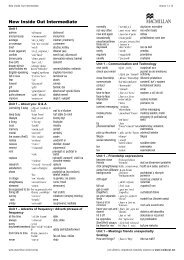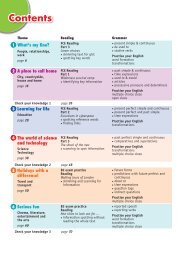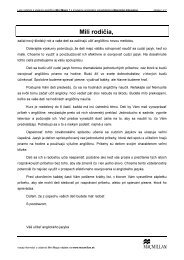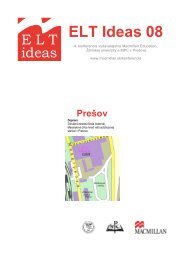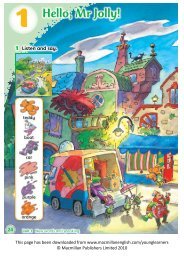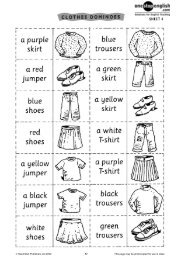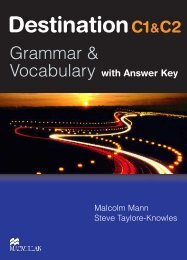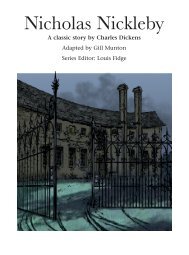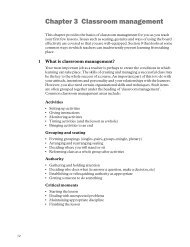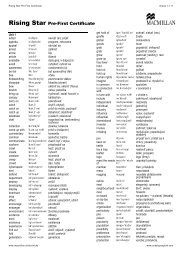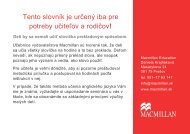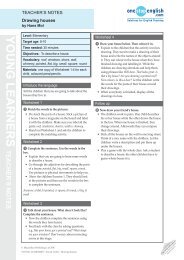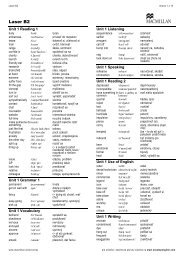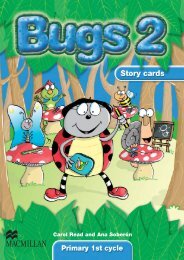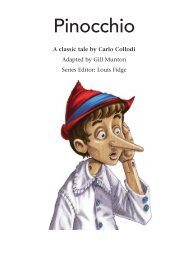A NEW four-level course for teenagers
A NEW four-level course for teenagers
A NEW four-level course for teenagers
Create successful ePaper yourself
Turn your PDF publications into a flip-book with our unique Google optimized e-Paper software.
A <strong>NEW</strong> <strong>four</strong>-<strong>level</strong> <strong>course</strong> <strong>for</strong> <strong>teenagers</strong>
CONTENTS<br />
Pages 4 & 5<br />
Pages 6 & 7<br />
Pages 8 & 9<br />
Page 10<br />
Page 11<br />
Pages 12 & 13<br />
Pages 14 & 15<br />
Pages 16 & 17<br />
Pages 18, 19 & 20<br />
Page 21<br />
Focus on Grammar & Lexis<br />
Focus on Speaking Skills<br />
Focus on Listening Skills<br />
Focus on Reading Skills<br />
Focus on Writing Skills<br />
Focus on Integrated Skills<br />
Focus on Inspiration Extra!<br />
Focus on Culture<br />
Unit at-a-glance<br />
Components and ISBNs<br />
inspiration
WELCOME TO INSPIRATION<br />
Inspiration <strong>for</strong> students<br />
Ages<br />
This is a <strong>course</strong> which grows with its students: a 13-yearold<br />
lives in a different world from a 16-year-old.<br />
Abilities<br />
Interests<br />
Every class is a mixed-ability class. So we’ve developed<br />
flexible materials which offer a variety of learning paths to<br />
success. Inspiration has optional activities within lessons,<br />
and special Revision and Extension sections at the end of<br />
each unit to cater <strong>for</strong> differences in ability.<br />
The material caters <strong>for</strong> a variety of different interests.<br />
We’ve provided a wide range of materials to engage students<br />
in challenging but achievable tasks. And language learning<br />
should be fun, so we’ve included lots of songs, games, poems<br />
and puzzles, as well as a complete story to encourage<br />
reading practice.<br />
Learning backgrounds<br />
Students come to the English class with differing learning<br />
histories. The Inspiration syllabus revises and recycles<br />
language in fresh contexts so that no one misses out.<br />
Learning styles<br />
We believe that it’s important <strong>for</strong> students to ‘learn how<br />
to learn’: to experiment with different learning styles and<br />
develop language learning strategies which suit them.<br />
Aspirations<br />
Within each adolescent there’s a young adult in the<br />
making. We’ve aimed to provide students with practical<br />
language skills and a positive attitude to learning – to lead<br />
them to success in examinations and prepare them <strong>for</strong> using<br />
English in the real world.<br />
Inspiration <strong>for</strong> teachers<br />
Class sizes and numbers of hours a week<br />
We understand that you need flexibility. The Teacher’s<br />
Book offers lesson plans full of extra optional activities<br />
which can be given to less confident learners or to fastfinishers.<br />
And the Workbook exercises can all be used <strong>for</strong><br />
self-study.<br />
Saving time<br />
In a perfect world, we’d all have time to prepare lessons<br />
thoroughly. But we know that the world is far from perfect,<br />
so we’ve designed lessons to be taught from the Student’s<br />
Book without preparation. And the Teacher’s Book provides<br />
detailed lesson plans, including suggestions <strong>for</strong> warmers,<br />
follow-up activities and homework, as well as useful<br />
background cultural in<strong>for</strong>mation – and of <strong>course</strong>, all<br />
the answers.<br />
Levels of motivation<br />
We’re very aware that motivating students is hard work.<br />
In that situation, what we all need is inspiration. And now<br />
you’ve got Inspiration!<br />
With our very best wishes <strong>for</strong> happy<br />
and successful English classes!<br />
3
GRAMMAR & LEXIS<br />
“There is a clearly structured approach to grammar,<br />
with controlled practice exercises leading to fluency<br />
activities.”<br />
The Word List at the back of the Student’s<br />
Book includes all the new words in each<br />
unit with phonemic transcriptions.<br />
New language is presented in a dialogue, as<br />
in this case, or a prose text.<br />
There is usually a completion exercise to<br />
help students become familiar with the <strong>for</strong>m<br />
of the target language. The Teacher’s Book<br />
provides suggestions <strong>for</strong> further practice<br />
activities.<br />
4
Many classroom activities are provided to<br />
revise and extend lexical fields, and students<br />
are encouraged to maintain their own<br />
vocabulary notebooks.<br />
Grammar boxes in the lessons are crossreferenced<br />
to a comprehensive Grammar<br />
Summary at the back of the Student’s Book,<br />
which provides full paradigms and<br />
explanations of grammatical points.<br />
Language items<br />
INSPIRATION 1<br />
• Classroom language: greetings,<br />
yes, no<br />
• Present simple: be<br />
• Personal pronouns<br />
• Questions: What ...? Where ...?<br />
Who ...?<br />
• this/that<br />
• Indefinite article<br />
• Singular and plural nouns (+<br />
irregular plurals)<br />
• Questions: What’s it called? How<br />
do you spell it?<br />
• I think ...<br />
• Alphabet<br />
• these/those<br />
• Prepositions of place: in, on,<br />
near, next to etc.<br />
• Time-telling<br />
• Questions: When ... ?<br />
How old ...?<br />
• Numbers to 10,000<br />
• Possessive adjectives<br />
• Ordinals<br />
• How do you pronounce...? What<br />
does ... mean? What’s the word<br />
<strong>for</strong> ...?<br />
• have: affirmative<br />
• can/can’t <strong>for</strong> permission and<br />
requests (Can I ...)<br />
• can/can’t <strong>for</strong> ability<br />
• Connectives: and, but, or<br />
• Imperatives + Don’t ...<br />
• Definite article<br />
• Present simple: affirmative:<br />
questions, negative and short<br />
answers<br />
• Prepositions of time: from ... to;<br />
at, in, on<br />
• Adverbs of frequency: always,<br />
never, often, sometimes, usually<br />
• How often ...?<br />
• There is/are ... a/some<br />
• How many ...?<br />
• Present continuous: affirmative,<br />
negative, questions<br />
• Present continuous v present<br />
simple<br />
• Possessive ’s<br />
• Possessive adjectives<br />
• Question: Whose ...?<br />
• Comparative and superlative<br />
adjectives<br />
• Past simple: was/were<br />
• Past simple regular and irregular<br />
verbs: affirmative and negative<br />
• Prepositions of time and ago<br />
• Past simple: questions and short<br />
answers<br />
• Connectives: when, be<strong>for</strong>e, after<br />
• going to: future plans<br />
• Why ...? Because ...<br />
• like/love/hate + noun/gerund<br />
• How much is ...?<br />
• I’d like/Would you like + noun?<br />
• Countable and uncountable<br />
nouns<br />
• Question: Which ...?<br />
• have got<br />
• Question: How much/many ...?<br />
• Question tags with be<br />
INSPIRATION 2<br />
• Present simple: states and<br />
routines<br />
• Present continuous<br />
• Possessive ’s and s’<br />
• Possessive adjectives and<br />
pronouns<br />
• Question: Whose ...?<br />
• Comparative and superlative<br />
adjectives (-er, the -est, more,<br />
the most)<br />
• should and shouldn’t: advice<br />
• Prepositions of place<br />
• Past simple regular and irregular<br />
verbs: affirmative and negative<br />
• Past simple: questions and short<br />
answers<br />
• Adverbial phrases of time<br />
• Past continuous<br />
• going to: future plans<br />
• will/won’t: future simple <strong>for</strong><br />
predictions<br />
• Adverbs of manner<br />
• Present continuous <strong>for</strong> future<br />
arrangements<br />
• Sequencing adverbials<br />
• Verb (give, show etc) + direct<br />
and indirect object<br />
• Object pronouns<br />
• can/could <strong>for</strong> requests<br />
• Prepositions of<br />
movement/direction<br />
• Countable and uncountable<br />
nouns<br />
• How much/many...?<br />
• some/any<br />
• Present perfect simple (and +<br />
just)<br />
• Present perfect simple +<br />
ever/never<br />
• too (much/many)/(not) enough<br />
...<br />
• must/mustn’t<br />
• have to/don’t have to/had<br />
to/didn’t have to<br />
• want/would like to + infinitive<br />
• I’d rather ...<br />
• Participial adjectives<br />
(bored/boring)<br />
• Verb + infinitive<br />
• Infinitive of purpose<br />
• Connectors: so, while<br />
• Question tags<br />
5
SPEAKING SKILLS<br />
“Students need interesting, imaginative and immediately<br />
useful tasks and topic to talk about.”<br />
Students need the safety of carefully staged<br />
speaking activities to enable them to<br />
develop the confidence to speak freely and<br />
fluently.<br />
“In Inspiration we offer<br />
plenty of practice in<br />
listening and reading the<br />
target language as<br />
important preparation<br />
<strong>for</strong> speaking.”<br />
“Fun and enjoyment are<br />
also important in getting<br />
students to talk.”<br />
Activities and tasks include:<br />
• Responding to dialogues<br />
• Text and pictures (e.g. asking and<br />
answering questions, describing,<br />
discussing, reacting)<br />
• Games and quizzes<br />
• Class surveys and questionnaires<br />
• Interviews<br />
• Acting out sketches<br />
• Role plays<br />
• Storytelling<br />
• In<strong>for</strong>mation-gap communication<br />
activities<br />
Pronunciation<br />
practice<br />
The first three lessons of each<br />
unit provide explicit work on<br />
pronunciation, stress and<br />
intonation arising from the<br />
lesson language. There is also<br />
a Pronunciation Guide at the<br />
back of the Student’s Book.<br />
The Workbook provides further<br />
pronunciation exercises and<br />
the Teacher’s Book gives more<br />
in<strong>for</strong>mation about the<br />
phonological area being<br />
treated.<br />
6
INSPIRATION 1 You can …<br />
• Describe people and places<br />
• Describe people in a photograph<br />
• Talk about things you can do<br />
• Follow instructions<br />
• Compare timetables and routine activities<br />
• Interview people about leisure activities<br />
• Talk about what people are doing<br />
• Compare the differences in two pictures<br />
• Describe a room<br />
• Ask and answer questions about people’s jobs<br />
• Talk about the weather<br />
• Choose the right thing to say in a social situation<br />
• Ask and answer questions about past events<br />
• Tell a story<br />
• Discuss what you are going to do<br />
• Talk about favourite activities<br />
• Compare things and people<br />
• Do a survey<br />
• Exchange in<strong>for</strong>mation about countries and continents<br />
• Ask <strong>for</strong> and give advice<br />
• Ask what food people would like<br />
• Talk about possessions<br />
• Ask the price of things<br />
• Make and reply to invitations<br />
• Give definitions of words<br />
Carefully organised pairwork means that<br />
students are given the necessary linguistic<br />
tools <strong>for</strong> the task and clearly understand<br />
exactly what they have to do.<br />
“Different activities and topics<br />
appeal to different people and in<br />
Inspiration we offer the widest<br />
variety possible.”<br />
INSPIRATION 2 You can …<br />
• Describe where people are and what they are doing<br />
• Ask and answer questions about people’s jobs<br />
• Talk about carnivals and festivals<br />
• Say what people should and shouldn’t do in your country<br />
• Interview people about what they love/hate doing<br />
• Interview people about what they did last weekend<br />
• Talk about the life of a famous person<br />
• Ask and answer questions about history<br />
• Say what you think will happen next<br />
• Describe your favourite TV programme<br />
• Talk about your holiday plans<br />
• Ask <strong>for</strong> and give directions to places<br />
• Order a meal in a restaurant<br />
• Exchange in<strong>for</strong>mation about experiences<br />
• Say what’s good and bad about your town<br />
• Ask about rules<br />
• Talk about a trip<br />
• Give definitions of words<br />
• Describe someone’s character<br />
• Describe a process<br />
7
LISTENING SKILLS<br />
“Inspiration offers tasks which prepare the learner <strong>for</strong> realworld<br />
listening.”<br />
At the first two <strong>level</strong>s in Inspiration you<br />
will find a carefully graded series of<br />
listening texts based on authentic sources<br />
which build the learner’s confidence.<br />
“All our reading texts are<br />
recorded so students can<br />
listen and read at the<br />
same time.”<br />
Inspiration requires the students to carry<br />
out activities without the texts to reflect<br />
real life. However, unlike real life, these<br />
listening activities can be repeated so<br />
that the less confident students can make<br />
progress.<br />
And listening can also be<br />
fun - that’s why<br />
Inspiration has great<br />
songs to listen to. The<br />
Teacher’s Book offers<br />
further support with<br />
suggested links to<br />
websites where students<br />
can look up the lyrics of<br />
songs they have listened<br />
to outside the classroom.<br />
Listening activity types include:<br />
• Completing charts<br />
• Forms and timetables<br />
• Matching words and pictures<br />
• Note-taking<br />
• Choosing from a list<br />
• Finding in<strong>for</strong>mation in pictures<br />
• Correcting mistakes in written texts<br />
• Identifying sounds of activities<br />
• Checking answers, matching descriptions and photos<br />
8
INSPIRATION 1 you can listen to and understand...<br />
• Numbers and dates<br />
• Names and addresses<br />
• In<strong>for</strong>mation about countries and population<br />
• A song<br />
• Instructions on making international calls<br />
• Details of school timetables<br />
• Phone calls saying what is happening<br />
• The answers to a questionnaire and a quiz<br />
• Descriptions of past events<br />
• Part of a story<br />
• A conversation about likes and dislikes<br />
• Calls to a radio travel programme<br />
• A conversation about possessions<br />
• A conversation at a party<br />
• Phone calls making and replying to invitations<br />
INSPIRATION 2 you can listen to and understand...<br />
• An interview about making a film<br />
• An interview about personal likes and dislikes<br />
• A description of a celebration<br />
• A song<br />
• A conversation about recent activities<br />
• A story of an accident<br />
• A description of the life of a famous person<br />
• Drama exercises<br />
• In<strong>for</strong>mation about changes to a schedule<br />
• A conversation about holiday plans<br />
• An interview about recent activities<br />
• A video commentary about city sights<br />
• A description of a famous statue<br />
• The rules of a competition<br />
• A description of a trip<br />
• A conversation between friends at a party<br />
Listening in class does not only mean<br />
listening to the teacher or the recording, it<br />
also means listening to other students, and<br />
the communication activities <strong>for</strong> each unit<br />
provide task-based opportunities <strong>for</strong> this.<br />
• Numbering pictures in the right order<br />
• Completing sentences and notes<br />
• Numbering parts of a text in the right order<br />
• Matching words and definitions<br />
• Choosing the correct answer<br />
• Matching times and actions<br />
• Following a route on a map<br />
• Jigsaw note-taking<br />
9
READING SKILLS<br />
“We have tried to create, find and adapt texts which the<br />
learners will read because they want to, not just because<br />
they have to.”<br />
All the reading texts are recorded<br />
so students can listen to the text<br />
in addition to reading it.<br />
The Teacher’s Book provides prereading<br />
activities and a wealth of<br />
further optional post-reading tasks.<br />
INSPIRATION 1 You can read …<br />
• Facts about people’s families<br />
• Descriptions of places<br />
• Text messages<br />
• A description of a band<br />
• An article about a famous person<br />
• A personal letter<br />
• A sketch<br />
• A comparison of teenage lifestyles<br />
• Emails about what’s happening and routines<br />
• A questionnaire about personality<br />
• A quiz about the past<br />
• A puzzle<br />
• Articles about the weather, history, hobbies<br />
and animals<br />
• A story<br />
• Messages<br />
• A website advice page<br />
• Descriptions of food and routines in different<br />
countries<br />
• Invitations<br />
• A thank-you letter<br />
INSPIRATION 2 You can read …<br />
The Teacher’s Book contains Useful<br />
In<strong>for</strong>mation boxes which provide<br />
supplementary – often cultural –<br />
in<strong>for</strong>mation to help the teacher answer<br />
student questions about the content of the<br />
reading texts.<br />
The Workbook contains a parallel set of<br />
reading texts to support and rein<strong>for</strong>ce the<br />
reading work done in the Student’s Book.<br />
The Workbook also contains a complete story<br />
and unit-by-unit recommendations of guided<br />
readers to encourage extensive reading.<br />
• A quiz<br />
• An article with personal in<strong>for</strong>mation<br />
• A sketch<br />
• A sightseeing guide<br />
• An article about carnivals<br />
• A questionnaire<br />
• An article about a historical event<br />
• A biography of a famous person<br />
• An article about the history of a city<br />
• A magazine article about TV programmes<br />
• A schedule about the weekend’s arrangements<br />
• A menu<br />
• A travel guide with tips <strong>for</strong> backpackers<br />
• An article about famous places<br />
• A guide to a museum<br />
• A description of a tourist attraction<br />
• An article about body language<br />
• An article about animated films<br />
• A story<br />
10
WRITING SKILLS<br />
“Writing skills development is a vital part of the<br />
Inspiration approach to skills.”<br />
Each lesson ends with a writing<br />
activity to rein<strong>for</strong>ce the target<br />
language.<br />
Writing tasks can take English<br />
beyond the classroom and become<br />
real-life tasks.<br />
INSPIRATION 1 You can write …<br />
• Notes about personal in<strong>for</strong>mation<br />
• An address<br />
• A <strong>for</strong>m with personal details<br />
• In<strong>for</strong>mation about a place<br />
• A questionnaire<br />
• A description of what you do at the weekend<br />
• A letter to a penfriend<br />
• An email about where you are and what you<br />
are doing<br />
• A dialogue about possessions<br />
• A personality description<br />
• A dialogue about past events<br />
• Questions <strong>for</strong> a website message board<br />
• A short paragraph<br />
• Messages and cards<br />
• Notes from phone calls<br />
• A thank-you letter<br />
INSPIRATION 2 You can write …<br />
• A description of a photo<br />
• A personal profile<br />
• Notes about a famous person<br />
• A description of a place in your country<br />
• A poem<br />
• A diary entry<br />
• Notes and a description of the life of a famous<br />
person<br />
• In<strong>for</strong>mation about the history of your town<br />
• A letter about your holiday plans<br />
• A description of a TV programme and a<br />
character in it<br />
• A postcard<br />
• Directions from school to your home.<br />
• A dialogue between a customer and a waiter<br />
• A list of rules<br />
• An email in reply to an invitation<br />
• A description of a journey<br />
• In<strong>for</strong>mation <strong>for</strong> visitors to your country<br />
• A process description<br />
The Teacher’s Book offers<br />
further optional writing<br />
activities and suggests<br />
written homework <strong>for</strong> each<br />
lesson.<br />
The Workbook provides further<br />
written practice <strong>for</strong> each lesson, a<br />
new writing task <strong>for</strong> the Integrated<br />
Skills lessons, and unit-by-unit<br />
work on spelling.<br />
11
INTEGRATED SKILLS<br />
“We use an integrated skills approach in which the <strong>four</strong><br />
skills support each other so that listening and reading are<br />
a preparation <strong>for</strong> speaking and writing.”<br />
Careful attention is paid to the development<br />
of the <strong>four</strong> language skills in the three<br />
language practice lessons in each unit, while<br />
the <strong>four</strong>th lesson is a dedicated Integrated<br />
Skills lesson.<br />
Listening<br />
This listening activity is based on an<br />
authentic interview and develops intensive<br />
listening skills.<br />
Reading<br />
There are usually two or three reading<br />
activities moving from overall<br />
comprehension to more detailed reading.<br />
All reading texts are also recorded <strong>for</strong><br />
further skills development.<br />
Writing<br />
Students plan their writing task using the<br />
questions given and the new language from<br />
the unit.<br />
Phrasebook<br />
Phrasebook sections occur in every unit and help students to learn<br />
idiomatic expressions in context. After listening and repeating, the<br />
students look back through the unit to see where the expressions<br />
occurred; this helps them to use the expressions appropriately in<br />
the future.<br />
“We have provided opportunities <strong>for</strong> students to<br />
experiment with different learning styles and<br />
develop language learning strategies which suit<br />
them. We have tried to make students aware that,<br />
while they may have a preferred learning style,<br />
they could benefit from experimenting with others<br />
in order to become better language learners.”<br />
12
Learner Independence<br />
Learner independence sections typically<br />
include two activities, one focussing on<br />
learning to learn and the other on<br />
vocabulary development. This is supported<br />
by parallel sections in the Workbook and<br />
advice in the Teacher’s Book lesson notes.<br />
The approach to learner independence in<br />
the first two <strong>level</strong>s of the <strong>course</strong>.<br />
INSPIRATION 1<br />
• The alphabet<br />
• How to make and use a vocabulary notebook<br />
• How to use English words and phrases in the classroom<br />
• To recognise English words similar to words in your language<br />
• Words <strong>for</strong> punctuation marks<br />
• How to learn irregular verbs<br />
• How to learn outside the classroom<br />
INSPIRATION 2<br />
• Ways of finding the meaning of words<br />
• How to keep a personal phrasebook<br />
• Ways of learning words<br />
• How to assess your own progress<br />
• How to learn words through word association<br />
• How to group and remember words by topic<br />
• How words can make word combinations<br />
• Words we use to describe grammar<br />
• What ‘knowing’ a word means<br />
• The abbreviations we find in a dictionary<br />
• How to organise vocabulary<br />
• How to assess each other’s progress<br />
• Different learning strategies<br />
• How to define words<br />
• Different resources <strong>for</strong> practice<br />
Communication Activity<br />
Each Integrated Skills lesson concludes with page<br />
references to an in<strong>for</strong>mation-gap communication activity<br />
<strong>for</strong> the unit at the back of the book. The Teacher’s Book<br />
suggests procedures and provides answers.<br />
13
INSPIRATION EXTRA!<br />
“Inspiration Extra! contains projects and a range of fun<br />
activities, including songs, sketches <strong>for</strong> students to act<br />
out, word games, puzzles and limericks.”<br />
Project work<br />
The projects at the end of each unit<br />
<strong>for</strong>m an important part of the <strong>course</strong><br />
methodology.<br />
Projects provide a valuable resource<br />
<strong>for</strong> student creativity, self-expression<br />
and language consolidation. They also<br />
allow students of varying abilities to<br />
all contribute.<br />
Students are encouraged to save their<br />
projects to add to their portfolios.<br />
While intended <strong>for</strong> use with the<br />
whole class, the projects could also<br />
be used <strong>for</strong> homework or as<br />
supplementary material with more<br />
confident students in mixed-ability<br />
classes.<br />
Projects require students to go back<br />
through part of the unit which<br />
models the writing they will do.<br />
Then students brainstorm ideas,<br />
choosing a few to write about. A<br />
research phase follows using<br />
reference books, libraries or the<br />
Internet to gather in<strong>for</strong>mation <strong>for</strong><br />
the project. This could involve<br />
interviewing people, <strong>for</strong> example,<br />
family members. The group then<br />
work together to produce their<br />
project, reading each other’s work,<br />
editing and illustrating it. The<br />
Teacher’s Book offers suggestions <strong>for</strong><br />
organisation.<br />
Game<br />
The games in each unit offer an excellent<br />
way <strong>for</strong> revising grammar and vocabulary.<br />
Further activities and ideas are offered in<br />
the Teacher’s Book.<br />
14
Revision and Extension<br />
Inspiration Extra! also includes a Revision and<br />
Extension section which caters <strong>for</strong> two different ability<br />
<strong>level</strong>s, recycling and extending language from the<br />
preceding <strong>four</strong> lessons. There are further Revision and<br />
Extension sections in the Workbook.<br />
Revision<br />
The Revision exercises provide further writing<br />
practice <strong>for</strong> less confident students in mixedability<br />
classes.<br />
Extension<br />
The Extension exercises provide challenging<br />
writing practice <strong>for</strong> more confident students.<br />
Sketches and Songs<br />
Inspiration Extra! sections contain a sketch or song in<br />
alternate units. The aim of sketches, like the songs, is <strong>for</strong><br />
Students to enjoy using English while also getting<br />
valuable stress and intonation practice. The Teacher’s<br />
Book also has suggestions <strong>for</strong> using the recording and <strong>for</strong><br />
acting out the sketches.<br />
15
CULTURE<br />
“Each <strong>level</strong> also features <strong>four</strong> Culture Sections which<br />
build cross-cultural awareness, encourage discussion and<br />
develop vocabulary.”<br />
The language lessons themselves offer a<br />
wealth of insights into the history and<br />
culture of the English-speaking world.<br />
The Workbook contains further Culture<br />
sections with reading, writing and<br />
vocabulary exercises.<br />
Reading<br />
Comprehension questions<br />
focus on text structure<br />
and the main ideas.<br />
“The Culture section<br />
texts provide a rich<br />
source of useful<br />
vocabulary.”<br />
Vocabulary<br />
The vocabulary work associated with<br />
the culture texts concentrate on new<br />
words needed <strong>for</strong> comprehension.<br />
16
Topics covered in the Culture sections at<br />
<strong>level</strong>s 1 and 2:<br />
The Teacher’s Book offers further<br />
in<strong>for</strong>mation on culture in Useful<br />
In<strong>for</strong>mation boxes.<br />
• Countries and Languages<br />
• Take Two Teenagers – North and South<br />
• Gestures and Situational language<br />
• Food Around the World<br />
• Welcome to London<br />
• Hello New York!<br />
• Teenage Life<br />
• Do the Right Thing<br />
The Teacher’s Book also provides at least<br />
one weblink <strong>for</strong> each lesson. In this<br />
lesson, students are encouraged to look at<br />
a website that gives all the latest news<br />
about London.<br />
Writing<br />
The Writing exercises in the Culture<br />
sections typically use the text as a model<br />
and invite the students to write about<br />
aspects of their own culture.<br />
17
UNIT AT-A-GLANCE<br />
The first three lessons in each unit present new language. The heading shows the<br />
unit topic and the grammatical and functional aims of the lesson. The patterns of<br />
the lessons vary from lesson to lesson but always include pronunciation and end<br />
with writing.<br />
Opener<br />
The aim of the Opener is to<br />
pre-teach vocabulary, set the<br />
scene <strong>for</strong> the text, or both.<br />
Speaking<br />
The focus now moves to<br />
students using the<br />
target language to<br />
communicate. The<br />
language is often<br />
personalised.<br />
Presentation<br />
The new language is<br />
presented in a prose text or<br />
a dialogue. After pre-reading<br />
prediction activities,<br />
students read the text or<br />
dialogue while they listen to<br />
the recording.<br />
Pronunciation<br />
Each of the first three<br />
lessons in every unit a<br />
contain pronunciation<br />
exercise focussing on<br />
particular sounds or stress<br />
and intonation.<br />
Grammar<br />
Grammar boxes highlight the<br />
target language with sentences<br />
from the presentation text or<br />
paradigms <strong>for</strong> the students to<br />
complete.<br />
Grammar practice<br />
This is usually a completion<br />
exercise to help students<br />
become more familiar with the<br />
<strong>for</strong>m of the target language.<br />
Writing<br />
Each of the first three<br />
lessons in each unit ends<br />
with a writing activity.<br />
These typically have the<br />
dual function of writing<br />
skills development and<br />
rein<strong>for</strong>cement of the<br />
target language.<br />
▼<br />
18
The <strong>four</strong>th lesson in each unit is an Integrated Skills lesson. In these lessons the <strong>four</strong><br />
skills support each other, moving from a reading text to a listening activity, then a<br />
speaking activity based on the listening or reading and concluding with a writing<br />
activity. The lesson ends with Learner Independence and Phrasebook sections.<br />
Reading<br />
There are usually two or three reading<br />
activities moving from overall<br />
comprehension to more detailed reading.<br />
Writing<br />
Here students are given guidelines<br />
<strong>for</strong> writing a description of an<br />
event. The text in exercise 2<br />
provides a model <strong>for</strong> their writing.<br />
Learner Independence<br />
Learner Independence sections typically<br />
include two activities, one focussing on<br />
learning to learn and the other on<br />
vocabulary development.<br />
Listening<br />
This activity develops intensive listening<br />
skills.<br />
Phrasebook<br />
Phrasebook sections occur in every unit<br />
and helps students to learn idiomatic<br />
expressions in context.<br />
▼<br />
Communication activity<br />
Each Integrated Skills lesson concludes<br />
with page references to an in<strong>for</strong>mationgap<br />
communication activity <strong>for</strong> the unit at<br />
the back of the book.<br />
Inspiration Extra! follows the<br />
Integrated Skills lesson in<br />
each unit and always includes<br />
a project and a Game plus<br />
either a Sketch or a Song and<br />
mixed-ability activities.<br />
▼<br />
Project<br />
Projects provide a valuable resource <strong>for</strong> student<br />
creativity, self-expression and language<br />
consolidation. Students are encouraged to save<br />
their projects to add to their portfolios.<br />
Game<br />
The games in each unit offer an excellent way<br />
<strong>for</strong> revising the grammar and vocabulary. The<br />
Teacher’s Book offers further optional activities.<br />
Revision<br />
The Revision exercises provide further<br />
writing practice <strong>for</strong> less confident<br />
students in mixed-ability classes.<br />
Extension<br />
The Extension exercises provide challenging<br />
writing activities <strong>for</strong> more confident<br />
students in mixed-ability classes.<br />
19
At the end of each unit you will find alternating Culture or Review sections.<br />
Culture<br />
There are <strong>four</strong> Culture sections at<br />
each <strong>level</strong> of Inspiration providing<br />
both factual in<strong>for</strong>mation and the<br />
opportunity <strong>for</strong> cross-cultural<br />
comparisons. The section illustrated<br />
here provides in<strong>for</strong>mation about the<br />
history of New York and American<br />
English.<br />
Reading<br />
Comprehension questions focus on text<br />
structure and the main ideas.<br />
Vocabulary<br />
The texts provide a rich source of useful new<br />
vocabulary. The vocabulary work associated with<br />
the Culture texts concentrates on new words<br />
needed <strong>for</strong> comprehension.<br />
Writing<br />
The Writing exercises in the Culture sections<br />
typically use the text as a model and invite<br />
the student to write about aspects of their<br />
own culture.<br />
Review<br />
There are <strong>four</strong> Reviews at each <strong>level</strong><br />
of Inspiration. Each Review covers<br />
the grammar and vocabulary of the<br />
preceding two units.<br />
Grammar<br />
Each review begins with a text covering the<br />
grammar of both units with Cambridge<br />
examination-type objective test questions,<br />
usually multiple-choice. This is followed by<br />
exercises focussing on a grammar point from<br />
the two units.<br />
▼<br />
Vocabulary<br />
Vocabulary exercises include completion,<br />
matching words with their definitions,<br />
collocation, and word groups.<br />
20
COMPONENTS<br />
Student’s Book<br />
• Presents language through dialogues and texts; at <strong>level</strong>s<br />
1 and 2 the dialogues feature an international group of<br />
<strong>teenagers</strong> with whom the students can identify, while<br />
the prose texts focus on topics of interest and relevance<br />
to the students’ lives<br />
• Features Culture sections which build cross-cultural<br />
awareness and encourage discussion<br />
• Provides Review sections giving regular opportunities <strong>for</strong><br />
revision and self-assessment progress checks<br />
• Includes in<strong>for</strong>mation-gap Communication Activities and<br />
a detailed Grammar Summary at the back of the book<br />
Workbook<br />
• Provides a wealth of extra grammar and vocabulary<br />
exercises, integrated skills texts and activities,<br />
pronunciation work, revision and extension and review<br />
material, and learner independence and self-assessment<br />
sections, all keyed into the Student’s Book lessons<br />
• Includes brainteasers, crosswords, a unit-by-unit story<br />
<strong>for</strong> extensive reading and suggestions <strong>for</strong> further reading<br />
• Features suggestions <strong>for</strong> follow-up work on the Internet<br />
Teacher’s Book<br />
• Provides step-by-step teaching notes with choices of<br />
warmers and homework <strong>for</strong> each lesson, tapescripts and<br />
full answer keys<br />
• Includes a wide range of extra optional activities which<br />
can be given to less confident learners or to fastfinishers<br />
• Features useful additional cultural in<strong>for</strong>mation to answer<br />
those difficult questions<br />
Inspiration 1<br />
Student’s Book 1 4050 2935 8<br />
Workbook 1 4050 2936 6<br />
Teacher’s Book 1 4050 2947 1<br />
Class Audio CD 1 4050 2939 0<br />
Class Audio Cassette 1 4050 2938 2<br />
Inspiration Builder 1 4050 29955 2<br />
Inspiration Companions: French / Dutch / German<br />
Inspiration Companion Pack: French / Dutch / German<br />
Inspiration 2<br />
Student’s Book 1 4050 2940 4<br />
Workbook 1 4050 2941 2<br />
Teacher’s Book 1 4050 2942 0<br />
Class Audio CD 1 4050 2944 7<br />
Class Audio Cassette 1 4050 2943 9<br />
Inspiration Builder 1 4050 6653 9<br />
Inspiration Companions: French / Dutch / German<br />
Inspiration Companion Pack: French / Dutch / German<br />
Inspiration Builder – a teacher’s<br />
resource pack<br />
• Provides additional photocopiable material to support<br />
and develop language presented in the <strong>course</strong><br />
• Offers stimulating activities to practise and consolidate<br />
target language: games, role plays, crosswords, and much<br />
more …<br />
• Designed to suit mixed-<strong>level</strong> classes<br />
Inspiration Companions<br />
• French, Dutch and German editions<br />
• Lesson-by-lesson wordlists with part of speech,<br />
translations, phonetics and sample sentences to show<br />
the word in context<br />
• Translated easy-reference grammar summary<br />
• Phrase-bank of workbook rubrics to help the student<br />
when studying at home<br />
• A Companion Pack is also available, consisting of<br />
Student’s Book plus Companion<br />
Visit www.macmillanenglish.com/inspiration<br />
<strong>for</strong> a variety of teaching resources to support<br />
the <strong>course</strong><br />
Inspiration 3<br />
Student’s Book 1 4050 2945 5<br />
Workbook 1 4050 2946 3<br />
Teacher’s Book 1 4050 2937 4<br />
Class Audio CD 1 4050 2949 8<br />
Class Audio Cassette 1 4050 2948 X<br />
Inspiration Builder 1 4050 6654 7<br />
Inspiration Companions: French / Dutch / German<br />
Inspiration Companion Pack: French / Dutch / German<br />
Inspiration 4<br />
Student’s Book 1 4050 2950 1<br />
Workbook<br />
1 4050 2951 X<br />
Teacher’s Book 1 4050 2947 1<br />
Class Audio CD 1 4050 2954 4<br />
Class Audio Cassette 1 4050 2953 6<br />
Inspiration Builder 1 4050 6655 5<br />
Inspiration Companions: French / Dutch / German<br />
Inspiration Companion Pack: French / Dutch / German<br />
Inspiration 3 & 4 available from Jan 2006<br />
21
Judy Garton-Sprenger<br />
Philip Prowse<br />
inspiration<br />
The Course<br />
Inspiration is a motivating and sophisticated<br />
<strong>four</strong>-<strong>level</strong> <strong>course</strong> which takes <strong>teenagers</strong> from<br />
beginner to intermediate <strong>level</strong>.<br />
Judy Garton-Sprenger<br />
Judy has a wide range of experience in<br />
English language teaching through working<br />
as a teacher/teacher trainer, as a writer, and<br />
as an actor. With a degree in European<br />
Studies and a diploma in TEFLA, she joined<br />
International House in London, where<br />
teaching led to teacher training and to her<br />
first ELT writing project. She was also invited<br />
to join the English Teaching Theatre, with<br />
whom she toured Europe, Latin America,<br />
Japan, the Middle East and West Africa over<br />
a period of 14 years. During that time she<br />
became freelance, and has since then been a<br />
full-time teacher trainer and writer. She has<br />
spoken at conferences and led seminars <strong>for</strong><br />
teachers in Latin America, Western, Central<br />
and Eastern Europe, including work <strong>for</strong> the<br />
British Council, the Soros Foundation and<br />
universities throughout Britain. Meanwhile she<br />
has written numerous <strong>course</strong>books <strong>for</strong> adult,<br />
secondary and primary students. She has<br />
also been a Cambridge ESOL examiner, itemwriter<br />
and syllabus consultant, and written<br />
radio scripts <strong>for</strong> BBC English.<br />
Philip Prowse<br />
Philip began his professional life with the<br />
British Council, <strong>for</strong> whom he taught and<br />
trained teachers in Egypt, Portugal, Greece<br />
and Poland. Returning to the UK he became<br />
Principal of Bell College, Saffron Walden<br />
where he was responsible <strong>for</strong> a wide range of<br />
teacher training <strong>course</strong>s, as well as language<br />
<strong>course</strong>s <strong>for</strong> <strong>teenagers</strong> and adults. He has<br />
been writing throughout his career, and has<br />
been a full-time writer <strong>for</strong> the last ten years.<br />
Something he has greatly enjoyed over the<br />
years has been the opportunity to spend time<br />
in classrooms in different parts of the world,<br />
and it is from teachers and students that the<br />
inspiration to write comes. He has been a<br />
regular speaker at conferences and run<br />
teacher training <strong>course</strong>s in Europe, South<br />
America, Africa and Asia. Philip’s publications<br />
include a number of graded readers, three<br />
integrated skills series (as series editor),<br />
primary, secondary and adult <strong>course</strong>books<br />
and articles in professional journals. He is<br />
Reviews Editor of English Language Teaching<br />
Journal.<br />
The <strong>course</strong> inspires students to learn and provides the teacher with<br />
everything needed <strong>for</strong> successful lessons. It appeals to the modern<br />
teenager through imaginative and exciting topics, introduces up-to-date<br />
language and expressions, increases confidence through learner<br />
independence activities, offers regular opportunities <strong>for</strong> revision and selfassessment,<br />
and caters <strong>for</strong> different learning styles.<br />
The cross-curricular contexts of Inspiration provide a wide range of<br />
entertaining and contemporary materials to engage students’ interest<br />
and help to build receptive and productive vocabulary.<br />
Key features of the <strong>course</strong> include:<br />
● ‘Dual-entry’ possibility: Level 1 caters <strong>for</strong> complete beginners, and<br />
Level 2 <strong>for</strong> learners who have already done some English<br />
● A clearly structured approach to grammar and controlled practice<br />
exercises lead to fluency activities where students apply the target<br />
grammar in communicative situations<br />
● A mixture of texts and dialogues which focus on topics that are<br />
relevant to the students’ lives. These include a storyline with teenage<br />
characters at Levels 1 and 2 and a wide variety of realistic text types<br />
● Careful attention is paid to skills development in language<br />
presentation lessons and in the Integrated Skills lesson in each unit<br />
● The Integrated Skills lessons also focus on the development of learner<br />
independence<br />
● Inspiration Extra! pages in each unit contain Revision and Extension<br />
exercises which cater <strong>for</strong> mixed-ability classes, providing<br />
rein<strong>for</strong>cement <strong>for</strong> less confident learners and challenging activities <strong>for</strong><br />
more confident ones. These pages also offer project work, songs,<br />
sketches <strong>for</strong> students to act out, word games, puzzles and limericks<br />
● Four Review sections revising grammar and vocabulary, with selfassessment<br />
progress checks<br />
● Four Culture sections which build cross-cultural awareness and<br />
encourage discussion



